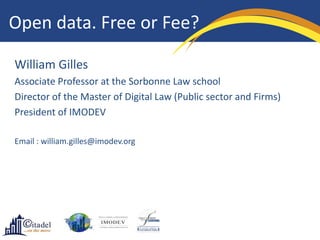
Conférence Open Data par où commencer ? "Free or fee?" Intervention W.Gilles
- 1. Open data. Free or Fee? William Gilles Associate Professor at the Sorbonne Law school Director of the Master of Digital Law (Public sector and Firms) President of IMODEV Email : william.gilles@imodev.org
- 2. 3 Questions on the Possibility of Charging or Not the Access and the Re-use of the Public Sector Information • What? The Concepts? The Scope – We are going to speak about Open Data, Public Sector Information, Free Access, Fee Access, Open Access. • What are the common points and the differences? • What data are concerned? • Why? The Reasons – Why could you have a Free or a Fee Access and Re- Use of Public Sector Information? • How? The modalities – If local governments choose a Fee or a Free Access and Re-Use, how can do develop their open data policy. William Gilles – Email : william.gilles@imodev.org Issy-les-Moulineaux – 5th October 2012
- 3. What? The concepts. • This conference speaks about Open Data but the European Directive (2003) deals about Public Sector Information. • Is Data a synonymous of Public Sector Information? • When we wonder if we should have a free access or re-use, what data are concerned? – Private # Public data corresponds to all the information produced, collected or paid by public bodies. • For instance: geographical data, statistics, meteorological data, data from publicly funded research projects, and digitalized books from libraries – “Raw Data corresponds to quantities or other quantities or qualitative attributes derives from observation, experiment, measurement or computation. The data are not structured, contextualised or commented” Cf. J. Pénin (coord.), BETA – “Information corresponds to a set of contextualised and structured data, the producer’s intention being to make them meaningful”. Cf. J. Pénin (coord.), BETA William Gilles – Email : william.gilles@imodev.org Issy-les-Moulineaux – 5th October 2012
- 4. What? The concepts. • What can we call Open Data, Access and Re-Use? – Access is not The Re-Use of Data: According to the EU : • “Access, under national freedom of information regulations, is all about obtaining the information. The Directive does not touch upon the existing access regimes in Member States”. • Free access or re-use is not synonym to “open access or re-use” • A paid access or re-use does not give all rights to the one who accept to pay William Gilles – Email : william.gilles@imodev.org Issy-les-Moulineaux – 5th October 2012
- 5. What? The scope. If we make something free or paid, what does it concern ? • The question to make a free or paid access and re-use of data raise another one : what is the legal framework? – Indeed, local governements sould make money with their datas only if they have the right to do that! – Possibility for governement to make paid the re-use of data can be recet (cf. French example) • There is no Open Data Legal framework itself. But we can refer to the PSI Directive • of about Data that are ruled by the PSI Directive. • But not all data are concerned by the 2003 PSI Directive. • But the scope of application of the current Directive (of 2003) is restricted. – For instance, are excluded from the scope of the PSI Directive of 2003 : • Bodies of industrial or commercial character, e.g. public transport authorities; • Educational and research establishments, • Performing cultural institutions such as operas, ballets and theatres as well as public service broadcasters, as there may be issues related to intellectual property rights. – New possibilities should be offered with the revision of the Directive : • New bodies such as libraries (including university libraries), museums and archives • Limitation of fees William Gilles – Email : william.gilles@imodev.org Issy-les-Moulineaux – 5th October 2012
- 6. Why? The Reasons : Free or Fees? • Why should we have a Free Access and Re-Use of Public Sector Information? – No doubt to make a Free Access. • According to me, the question of Fee concerns only the re- use of data, not the access. • Transparency – Question is about the re-use even in if this case, the free re-use should be the rule according to advantages • Development of the economy • New public services William Gilles – Email : william.gilles@imodev.org Issy-les-Moulineaux – 5th October 2012
- 7. Why? The Reasons : Free of Fees? • Why could we have a Fee Re-Use of Public Sector Information? – Nothing is free ! • Better to say : No Fee re-use • To say that it has already paid by taxes is not a good argument. Prefer to say that • Possibility for local government to earn money and optimize their intangible assets – But fee can also have disadvantage and be a barrier to the development of the digital economy William Gilles – Email : william.gilles@imodev.org Issy-les-Moulineaux – 5th October 2012
- 8. How? Modalities of Data Access and Re- use: Free or Fees? • If there is fees, how could we do to prevent barriers in the deployment of the open data policy? • Another question is also who? – Can we make a distinction between Re-Users? William Gilles – Email : william.gilles@imodev.org Issy-les-Moulineaux – 5th October 2012